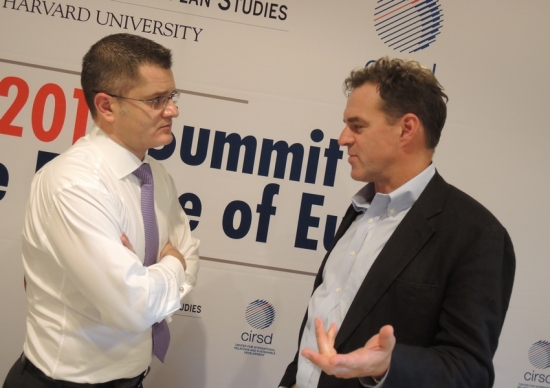The Center for International Relations and Sustainable Development (CIRSD) and the Harvard University Center for European Studies co-organized the second annual Summit on the Future of Europe which took place on 22-23 September at Harvard University.
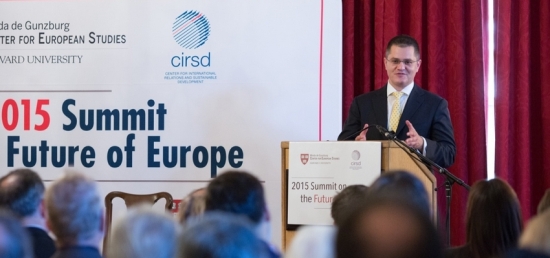
CIRSD President Vuk Jeremic and Grzegorz Ekiert, Professor of Government at Harvard University and Director of its Center for European Studies delivered opening remarks. Jeremic noted that political events taking place throughout the world are just beginning to affect Europe's strategic direction, yet Europe is increasingly turning inward, focusing on its internal challenges. This, he concluded, has made it harder for Europe to engage effectively beyond its immediate borders.
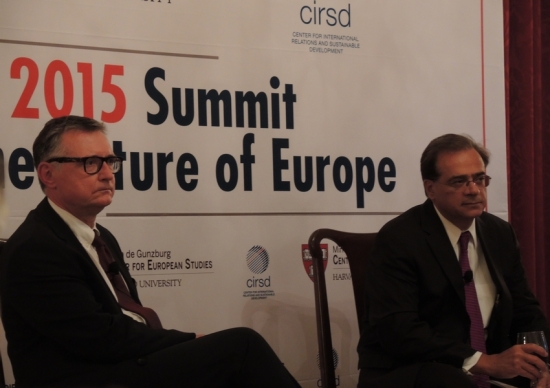
Focusing on the financial aspects of the current crisis in his opening address, Gikas Hardouvelis, Greece’s Minister of Finance from 2014 to 2015 and one of Europe's most respected economists, expressed optimism about the survival of the Euro and pessimism about Greece’s ability to remain a member of the single currency zone. The mainstream view of economists in the United States, he argued, is that the Euro will collapse due to the persistence of fiscal imbalances and differences in competitiveness between North and South. But this underestimates how effectively structural reforms have reestablished competitiveness in Southern countries, and overlooks some ambitious proposals for institutional reform that have recently been proposed by leading European officials. Turning to Greece, Mr. Hardouvelis argued that, by the end of 2014, the country’s prospects had been much more positive than is widely recognized. Had the victory of Alexis Tsipras’ Syriza movement not triggered a renewed confidence crisis, Greece would have returned to healthy growth in 2015, and the country’s debt would have proved sustainable. The political crises of the past months created economic havoc, and the policies of the newly reelected Syriza government will remain hostile to private enterprise for the foreseeable future. The result is concerning: Economic sentiment remains very pessimistic, and the Greek debt is no longer sustainable. Catastrophe is still avoidable, but the Greek economy—and the country’s membership in the single currency zone—is now “in the hands of the politicians.”
The Summit continued on the following morning with a panel on the refugee crisis now rocking Europe. In a wide-ranging discussion, panelists touched on historical, sociological, and legal aspects of “Fortress Europe.” Jacqueline Bhabha, FXB Center Director of Research at the Harvard T. H. Chan School of Public Health, emphasized that the migrant flow of recent months is smaller than that of Iraqis in the 1990s or of Afghanis in the 2000s; what is unprecedented is not the overall number of refugees, but rather the number of refugees reaching European shores. Recognizing that public sentiment has grown more welcoming of refugees over the last weeks, Professor Bhabha nevertheless emphasized the degree to which the public imaginary of Europe as a fortress has facilitated harsh policies which are irreconcilable with Europe’s idea of itself: many refugees are, for example, detained for long periods of time or lack adequate legal representation.
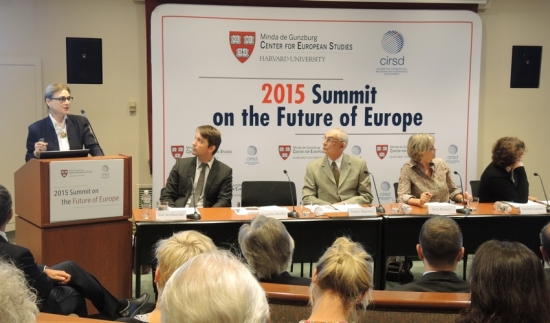
Patrice Higonnet, Robert Walton Goelet Professor of French History, Emeritus, at Harvard University, explained the present difficulty of integrating newcomers by giving a brief account of the history of immigration to France. While the country has experienced moments of “mini-mass migration,” Prof. Higonnet argued that the country’s lack of experience with true mass influxes of people has left France ill-equipped for the challenge of integrating newcomers in both practical and ideological terms. Finally, Jytte Klausen, Lawrence A. Wien Professor of International Cooperation at Brandeis University, emphasized that Europe is now faced with three concurrent crises: a humanitarian crisis brought about by mass flows of refugees from Syria and other conflict zones; a structural crisis as economic changes brought about by globalization will continue to attract high numbers of migrants to Europe in the coming decades; and a strategic crisis owed both to Europe’s lack of a long-term strategy for fighting terrorism and to its lack of perimeter control. Since these crises are interrelated, Professor Klausen argued, a real solution to any one will require a solution to all three.
The next panel centered around Europe’s relationship to its Southern neighborhood. It was kicked off by a thoughtful presentation by Sheikh Mohammad Sabah Al-Salem Al-Sabah, Foreign Minister of Kuwait from 2003 to 2011. Sheikh Mohammad contrasted radically differing perceptions of the Iran nuclear deal between the United States and the Gulf Cooperation Council (GCC). The United States sees the deal as an opening towards a major realignment in the Middle East, which will make it easier to pursue common security interests, like the fight against ISIS. In the view of the GCC, by contrast, the nuclear deal has ended Iran’s status as a pariah state, put to rest any prospect of regime change, and overlooked Iran’s ongoing role as a leading sponsor of state terrorism. Hedi Larbi, Tunisia’s Minister of Economic Infrastructure and Sustainable Development from 2014 to 2015, emphasized the serious problems facing North African countries: due to a serious public finance problem, their ability to stimulate the economy is constrained; high youth unemployment creates both economic and security risks; and weak states have trouble controlling migration flows. Overcoming these problems will require political vision, including help from outside forces to reduce youth unemployment and to provide assistance in the fight against terrorism.
Miguel Moratinos, Spain’s Minister of Foreign Affairs and Cooperation from 2004 to 2010, emphasized that Europe is not sufficiently engaged in the Middle East, and has failed to formulate an autonomous foreign policy. In his view, Europe has effectively “outsourced” decision-making about the Middle East to the United States despite important divergences of interest: “Where is European diplomacy?” he asked. “How are Europeans trying to reshape the region?” To overcome the crisis in the Middle East, he suggested, Europe should try to create a mechanism that might be modeled on the Helsinki Accords, and would incentivize local powers to respect human rights. In closing, Luís Amado, Portugal’s Minister of Foreign Affairs from 2006 to 2011, emphasized that Europe had failed to understand how significant a geopolitical change the end of the Cold War presented. Instead of recognizing the need for a more active foreign policy, European states took the path of least resistance, adopting mostly passive policies towards Russia and the Middle East. To start to repair Europe’s problems, the continent has to become a much more active player in its Southern neighborhood.
Over lunch at the Harvard Faculty Club, Michael Ignatieff, Edward R. Murrow Professor at the Harvard Kennedy School, and Thierry de Montbrial, Founder and President of the Institution for International Relations, had a lively debate about the future shape of Europe.
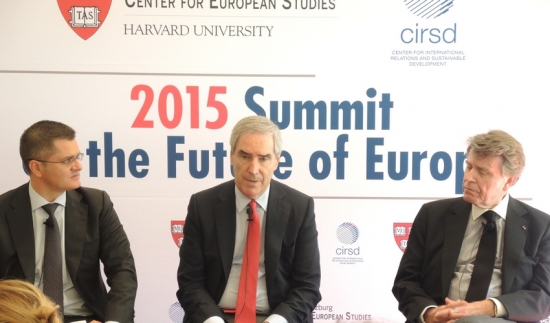
The dedate was moderated by CIRSD President Vuk Jeremic, who noted that of all the crises Europe is currently facing, the refugees one is at once the most visible and perhaps the one most directly touching on the question of European values.
Taking the floor, Ignatieff argued that a triple crisis is presenting a radical challenge to the very nature of Europe. The first is a “biblical exodus” of people from the Middle East, which Prof. Ignatieff interpreted as a plebiscite by hundreds of thousands of individuals on the failure of Western foreign policy. The second is the economic crisis, which has seen Southern European countries “exsanguinated” to the benefit of Northern Europe. Finally, the third is a multifaceted security crisis: Russia’s success in changing European borders by force has called into question the reliability of NATO security guarantees towards Central European and Baltic states; meanwhile, the Balkan states, subsisting in a “grey zone” without adequate security guarantees, are slowly turning into a “dangerous vacuum.” This is rooted in a broader failure to mutualize risk between different European countries, whether regarding sovereign debt, the distribution of refugees, or the prospect of Russian aggression in Southeastern Europe. Unless the continent undergoes serious reform, Prof. Ignatieff warned, it will “survive as a common market, but not as an identity or as a destination.”
In response, Thierry de Montbrial emphasized both the historical achievements of the European Union and the magnitude of the challenges it has faced in the past decades. With traditional nation states becoming too small to accomplish important tasks of domestic policy, international organizations like the European Union are the only way to formulate effective responses to shared challenges. “The EU,” Mr. de Montbrial asserted, “is the only positive political invention of the 20th century.” Similarly, he argued, it should hardly be surprising that the EU had not yet mastered all of the seismic transitions of the past quarter-century. The fall of the Soviet Union, for example, represented not only the collapse of the communist system but also the end of the Russian Empire; understood in this way, Europe has come a long way in dealing with the foreign policy challenges it faces.
After lunch, the conference turned to the task of building sustainable prosperity in the euro area. Kicking off a vivacious panel, Charles Wyplosz, Professor of International Economics at the Graduate Institute of International and Development Studies, insisted that the euro was a good idea despite the challenges of sustaining a single currency on a continent constituted by economically divergent nation states. The troubles of the euro were caused not by its conceptual premise, but rather by the flawed design of the specific institutions that were supposed to maintain it. There are, Prof. Wyplosz argued, no mechanisms for ensuring fiscal discipline, no common tools for dealing with the banking system, no central bank that was meant to act as a lender of last resort, insufficient attention to sovereign debt, and no governing mechanism for coordinating swift responses in moments of crisis. The problems of the euro, he concluded, can be solved—but only if Europe addresses these institutional shortcomings.
Markos Kyprianou, a former Minister of Foreign Affairs and Finance of Cyprus as well as a former EU Commissioner, offered a parallel account of the situation now facing Cyprus. While insisting that Cyprus was right to adopt the euro, he also argued that Europe had treated his country unfairly in failing to guarantee the bank deposits of all account holders during his country’s banking crisis. To create sustainable wealth, Cyprus—like other Southern European countries—now needs to continue on a path of ambitious structural transformation, including reforms to the civil service, the welfare state, and the labor market. Ricardo Hausmann, Professor of the Practice of Economic Development at the Harvard Kennedy School, agreed with the need for structural reforms, but emphasized the importance of a specific investment plan. Invoking the model of the Irish Development Agency, he suggested that Southern European countries should identify particular areas of development where they want to improve; talk to investors about what they would need to invest in that area; and then make particular changes—without offering substantial concessions to special interests, like tax holidays.
A conversation between Niall Ferguson, Laurence A. Tisch Professor of History at Harvard University and Vuk Jeremić, President of the CIRSD and Serbia’s Minister of Foreign Affairs from 2007 to 2012, rounded off the Second Annual Summit on the Future of Europe. Professor Ferguson urged the audience to put the crises currently facing Europe into wider historical perspective: The generation of Stanley Hoffmann, the recently deceased founder of the Center for European Studies, had lived through vastly greater mass migrations in the mid-20th century. Similarly, in the recent economic crisis, the output of the Eurozone as a whole had fallen much less dramatically than it had done in many major economies during the Great Depression. More broadly, Professor Ferguson argued, the two decades after the collapse of the Soviet Union had constituted a “Short Peace,” during which levels of conflict were unusually low. That Short Peace has now come to an end; as a result, Europe once again needs to grow accustomed to the realities of a bellicose world.
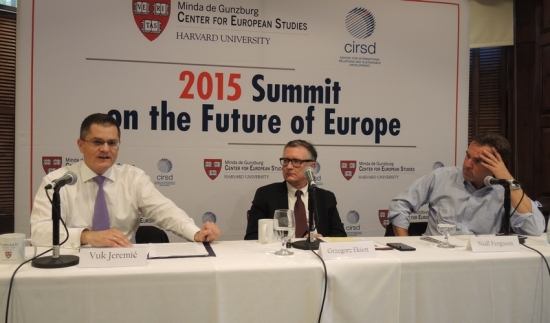
Vuk Jeremić acknowledged that his historical time frame is less long than Professor Ferguson’s, and emphasized that developments in the Balkans over the past few years had mostly been positive: even though the prospect of EU membership has recently become more remote in terms of a timeframe for accession, he indicated regretfully, all parties represented in the National Assembly in Serbia are now firmly committed to the prospect of European integration. And yet, Mr. Jeremić emphasized, Europe’s crisis—which began not in 2009, but with the failure of European elites to pass a constitution in 2005—was now a serious threat. Though populists in countries like France and Spain are unlikely to take over governments in the near future, their rise is already making it very difficult for the political establishment to pursue rational public policies. At the same time, an increasingly contentious political sphere is also making it very difficult for Europe to agree on a common foreign policy, or to react adequately to external crises in the Middle East. “As somebody who has been in politics,” Mr. Jeremić told Professor Ferguson toward the end of the conversation, “I'm concerned that just as in the past Europe substituted a foreign policy with an enlargement policy, now it's substituting foreign policy for a migration policy. To address the refugees issue, Europe must look to the source. Confronting the challenges in the Middle East can't be done by Europe alone, but these must not be done without Europe's engagement." Jeremic concluded by underscoring the strategic political and economic importance for Europe to strengthen its relations with both the United States (TTIP) and China (One Belt, One Road). Doing so could put Europe back iin the middle of global currents; a failure to do so could make it more difficult to participate as an equal in the task of rewriting the rules of 21st-century international relations.
